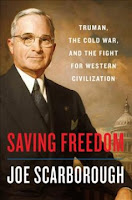Interspersed among LOTS and LOTS of mysteries, I read other stuff, too. As an exercise instructor, I'm always interested in health and nutrition. I guess this might be called my "professional reading".
When I saw the title
Food: What the Heck Should I Eat by Mark Hyman, I requested it. It is an eye-opening book in many ways. Dr. Hyman considers his program "Pegan". That's a cross between the
Paleo and Vegan diets. Very briefly (because his book includes a lot of detail), he says our bodies need the nutrients that can only be found in meat, fish and eggs (this is qualified in the next paragraph) and we should eat primarily fresh vegetables and some fresh fruit. He also says our bodies do not need grains, and that some people cannot eat them (e.g. celiac disease and gluten sensitivity).
The meat that is best for us comes from pastured beef. The way cattle are raised in this country, the massive operations, are cruel to the animals and result in meat that may be tender, but lacks much nutrition because of the way they are fed. Same for poultry, and therefore eggs.
He strongly recommends locally raised, organic foods whether meat, vegetables or fruit. He also says that our bodies cannot absorb much of the benefits of vegetables without fat and he's very much against low-fat diets. He makes a good case for high-carbohydrate diets being the cause of much of today's obesity. In his opinion, the culprits are sugar and starch.
What makes this book so compelling (and depressing at times) is his very broad view of our diets: not only the food itself, but how it's raised and the toll that raising has on our environment.

I know the name Barbara Ehrenreich from Ms Magazine. I also saw the play
Nickel and Dimed - On (Not) Getting by in America which was based on her book of the same name. I always thought she was a sociologist. Turns out she has a Ph.D. in cellular immunology. The book I read was
Natural causes: an epidemic of wellness, the certainty of dying, and killing ourselves to live longer. In it, she talks about the high cost of medical care and blames some of it on all of the testing that's done. She questions if annual physicals are really necessary for healthy people, feels that some testing (x-
rays, for example) create problems, and when a problem is found and a person goes through treatment, the treatment is often painful and the person dies anyway. What greater good is served by someone going through chemotherapy to lengthen their life by a few months?
There is a lot of anger in this book, some of which sounds justified. Ms Ehrenreich resents all of the medical intervention that happened while she was pregnant and delivering her children, most of which was unnecessary. Of course, it all cost money.
She has some chapters on human physiology, mostly at the cellular level, to describe how our bodies work. In many cases, those cells do what they want to do regardless of what we do. And therefore, despite our paying minute attention to diet and exercise, our longevity is somewhat predetermined by our genes and those cells doing what they want. We have a lot less control over our lives than we think.
There is a quality of life issue, though. Even if my age of death has to do with my DNA, I want to feel as strong and energetic as I can until then. So I watch what I eat (most of the time) and go to exercise class regularly.
And I'll keep reading books like this to try to learn as much as I can so that I can form my own educated opinion.























